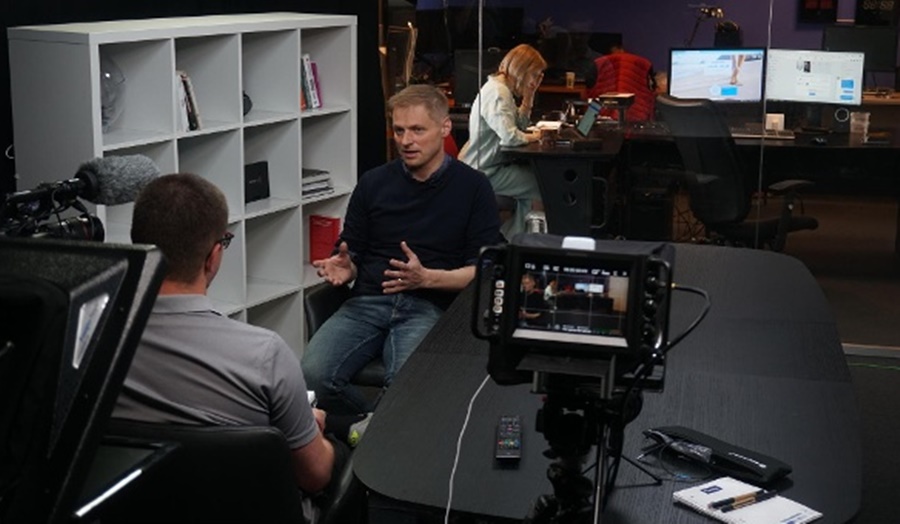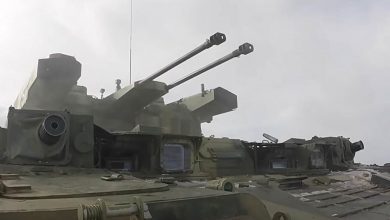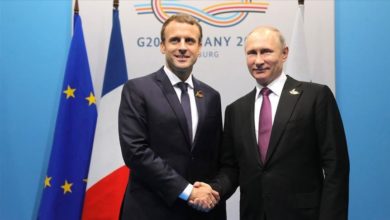
An office complex in the heart of Berlin forms the headquarters. Ost West TV broadcasts Russian news to the world from here. t-online took a look behind the scenes with the camera – and found a small team with big ambitions.
Suddenly, applause breaks out in the Berlin editorial office of Ost West TV. A colleague enters the small, approximately 20 square meter room and looks confused. “Is Putin dead?” he asks the group. Laughter and babble of voices mix. A young editor explains: “Our Russian reporter from Istanbul finally received a German visa. That’s why we cheered.” So the question about Putin was just a joke – or a vague hope expressed in a moment of euphoria.
Those gathered here had every reason to do so. Because the reporter mentioned had to leave Russia and had been stuck in Turkey for several weeks. Now he can finally enter Germany. The joy in the editorial office is great – so great that editor-in-chief Maria Makeeva gets wet eyes for a moment.
This little scene tells a lot about the TV station Ost West TV. It shows how the eleven employees who gathered for the editorial conference tick. She makes it clear: This Russian-language TV station reports critical of the Kremlin. Putin is the antagonist – and not the dazzling hero he is portrayed as on Russian state television. You can get an impression of it in our video.
The editor-in-chief is no stranger
The small editorial team originally set out to make German news in Russian for Russian-speaking people in Germany. But a lot has changed since the beginning of the war in Ukraine. Now the editors are trying to stand up to Putin’s propaganda machine.
Ost West TV went on the air for the first time in 1996, initially broadcasting programs and documentaries only about Berlin, and then later about the whole of Germany. A lot has changed with the new editor-in-chief Maria Makeeva, who joined the channel in 2017 and previously worked at the Russian opposition channel Dozhd and was recently even allowed to interview the Ukrainian President Volodymyr Zelenskyy. In the meantime, the station has also included news in its program.
“We are a small team”
Ost West TV can be received in Germany via a cable TV package together with other Russian channels. The station can also be received in the Ukraine and the Baltic States. In addition, they make their shows available on social media such as Facebook and YouTube. Financially, the private broadcaster lives mainly from its subscribers – currently there are three million. However, there are no big leaps. “We’re a small team and don’t have incredibly large capacities,” reveals moderator Konstantin Hackethal. Almost 15 people are part of the station’s core team, plus other freelancers.
It’s not just Russians who are working on the project. “People have a completely different, motley background,” says Hackethal. “They come from Kazakhstan, Russia or the Ukraine. We are all united here,” says Hackethal. “We don’t differ by nationality. Attitude is important – that’s what unites us.” And this attitude is directed against Putin’s propaganda. “We want life in Eastern European countries to be free – that people are not oppressed, that there is no war. We want to appreciate and report on these values, which we experience here in Germany and Europe,” explains Hackethal.
Konstantin Hackethal himself comes from Russia. He was born in Norilsk, a big city in the north of the country. In Moscow he studied linguistics. As part of his studies, he also went to Germany for the first time – an exchange program took him to Magdeburg. In 2008 it was love that finally made him move to Germany. Since then he has lived in Berlin.
Konstantin Hackethal: By chance in the media industry
He only got into journalism by accident. “A friend of mine who worked here asked me if I wanted to try my hand in front of the camera,” he recalls. He followed the suggestion out of sheer curiosity. “Then everything worked great and I had so much fun that I stayed here and have been working here for three years now,” Hackethal continued. Twice a week, always on Mondays and Wednesdays, he now presents the station’s main news at 7 p.m.
This was also the case this Wednesday, when the editors gathered in the small office shared by the moderator and editor-in-chief to plan the show. Hackethal spends most of the conference at his desk by the window, intently typing down the script for the show. He had already written ten pages before the conference. Now revised and supplemented.
Editor-in-Chief Maleeva is sitting at her desk in the other corner. She is a small woman – barely 1.60 meters tall – and almost sinks into her chair. But she is undoubtedly the boss. She chairs the conference and exchanges ideas with the other editors. She discusses possible topics with them and although the conference is held entirely in Russian, it is clear that there is not always agreement. One of the editors would like to travel to Dresden in the coming week. A peace demonstration is to take place there, where Ukrainian refugees and supporters of the Russian war could meet. But Maleeva speaks a word of power: too little capacity, other issues are more important.
She is continuing her Kremlin-critical course from Russia on Ost West TV – and not just since the outbreak of war. In the German-Russian community, Hackethal explains, this did not always bring praise. “There’s support and hate,” he says. But you shouldn’t pay too much attention to that. “That must not interfere with your work,” said the 46-year-old moderator.
However, a lot has changed for the station and its employees since the outbreak of war in Ukraine. The editorial office is located in an inconspicuous office building in Berlin-Charlottenburg. The rooms are sparsely furnished. An old blue carpet, small desks, a bookcase here and there. Only the station’s owner, who is rarely present, has his own office with a more ornate desk made of dark wood. But for weeks, various media representatives have been coming and going in the editorial office. Suddenly everyone is interested in the work of the small station. But Hackethal doesn’t really want to be happy about that. The occasion is too sad.
“The terrible images remain in the head”
The work of the editors has also changed as a result of the war. The stress has increased and the mental strain hits the minds of the employees. For weeks now, a psychotherapist has been coming to the editorial office to talk to the journalists. “The horrible images we see every day stay in our heads, and in the evening before we go to bed our minds start to work,” says Hackethal.
Some of the employees have friends and relatives in Ukraine. Hackethal himself also knows colleagues in Kyiv. “It’s all terrible. When you write with friends who are now sitting in a basement somewhere in Kyiv, it’s not a nice feeling,” he says. Nevertheless, the journalists continue to work. “We have to get through it somehow, but we’re mentally stressed,” said Hackethal.
Even if it’s difficult: even the dramatic images of the massacre in Bucha or the rocket attack on the Kramatorsk train station are no reason to change the moderation style. “It’s very difficult, but you can’t show your emotions in front of the camera,” said the moderator. As a journalist, he still wants to keep the necessary distance. “In war, the truth suffers first,” he says. “You have to keep a cool head and report facts instead of emotions.”
“It only works through fears and threats”
The truth suffers primarily from Kremlin propaganda. Hackethal knows that too. He says of the situation in Russia: “Many don’t know what war is. I recently watched Russian television for a very short time and you can’t stand it for long. It’s pure propaganda! It only works through fears and threats. The tenor is: Russia is the most beautiful country and surrounded by enemies, enemies, enemies.”
But many people in Russia are not open to the truth either. “People have a kind of blockage. They don’t want to hear the truth even though they know it’s the truth. They don’t want stress. They don’t want to form their own opinion because it’s work. To do that they would have to research, read, analyze and then it’s easier to buy a ready-made Kremlin product,” he says.
And yet the journalists do everything they can to counter the lies of the Kremlin. “Maybe someone accidentally sees our program on Facebook or other social media. Then they see the real pictures and maybe have doubts about the official version of the state media,” the moderator describes the broadcaster’s hope.
The journalist is well aware that the fight against the Kremlin’s huge propaganda machine can be a fight against windmills. “We’re not the BBC, ARD or ZDF. The situation has just changed so much all of a sudden. We don’t have time for strategic planning. We do what we do and we can’t completely change opinion in Russia. That’s what we’re for we’re too small. We’re realistic about that,” explains Hackethal.
However, this is not a disaster for the station. “Russia was never our main goal. It’s very nice that people in Russia looked at us, but our target group is here in Germany, Ukraine and other European countries,” he says. Does he still have hope that his home country could become a free country again in the foreseeable future? “It’s always difficult with hope,” says Hackethal skeptically. “I already had hope in the 1990s and 2000s. It’s better not to have any hopes. Now the war has to end first and then we’ll see what happens next,” he says. Until then, he and his colleagues will continue reporting the truth.



